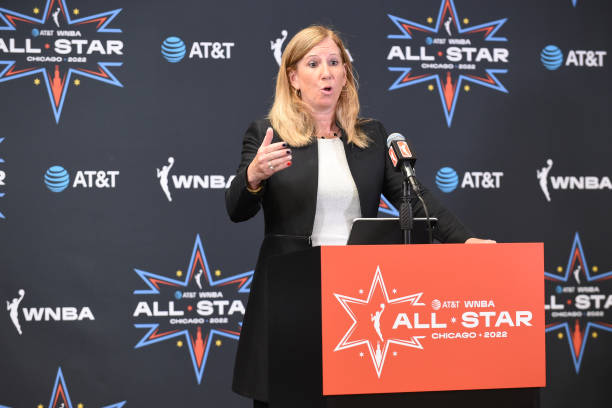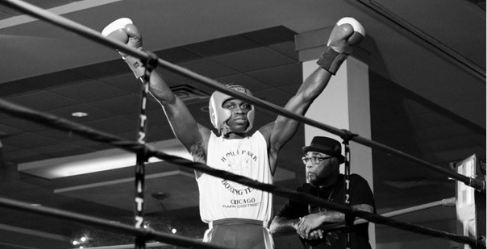(Main photo image credit: Ricardo Filipe)
Im from the South Side of Chicago.
In recent years, youve heard a lot about the violence that has plagued my city.
Every time I turn on the news or log on to social media, I see the term Chiraq. Frankly, it burns me up. I knew that people will start to believe whatever they are told. After all, the July 4th, 2014 weekend , in which 80 people were shot, didnt do us any favors.
Last summer, I attended the NABJ (National Association of Black Journalists) convention in Boston. When I was leaving my hotel to catch a cab, I struck up a conversation with some of the brothers who worked at the hotel. I told them, Im from Chicago. They responded, Damn! You got your bulletproof vest on?
I soon realized Chiraq wasnt going anywhere.
Last year, I attended the McDonalds All-American basketball game and asked then Curie Metropolitan High Schools (IL) ballyhooed phenom, Cliff Alexander, now a Portland Trailblazer, about Chicagos nickname.
I was born and raised here, he said. I love my city to death. Thats what everybody calls it. Chiraq.
In recent years, Chicago has become an international punchline when it comes to violence.
Remember when Robert Zimmerman, the brother of you know who, made the city a scapegoat for his brothers trial? He used the citys problems when defending his brothers actions by saying on CNN, Why don’t you report on all the black kids getting killed in Chicago?
The perception of the city, along with the violence, is constantly questioned by media outlets worldwide. Many of them have often under-reported what happens here. Complex Magazine and Huffington Post recently cited 2014 stats for the shootings that happened during the July 4th weekend. They couldnt even get the year right.
In 2013, the HBO show VICE called the South Side of the city a failed state within the borders of the U.S. That same show exposed the world to the Chiraq moniker.
According to whomever decided to use the moniker to link the citys problems with a war-torn country, more people were killed in Chicago than in Iraq. The term took off when Kanye West said the same on the Watch The Throne album with Jay-Z. Too bad that Ye didnt fact check his statement.
Often, the national media ignores that Chicago is a city of neighborhoods, and that every neighborhood has its own crime problems, said Michael Lansu, who covered homicides for the Chicago Sun-Times for the past two years. Not every neighborhood has a gun violence problem. In many neighborhoods, residents are far more concerned about burglaries. In other neighborhoods, residents are concerned about gun violence on certain blocks or in certain pockets.
The national media likes to make the generalization that all of Chicago has violence problem, and that there is a singular solution, Lansu continued. What works on the West Side might not work on the South Side, and vice versa.
Chiraq is a polarizing term for most Chicagoans.
Depending on where you live in the city, you might a different view of it.
National and international news is interpreted through the lens of whats happening in our world, said Monroe Anderson, a former Chicago Tribune and Ebony Magazine staffer who was also a press secretary to former Chicago mayor Eugene Sawyer. During the council wars, they referred to Chicago as Beirut on the Lake. Now you have it in certain neighborhoods, as much violence as Iraq so it becomes Chiraq. It has become suitable for what goes in certain pockets in town.
Anderson also believes he saw the genesis of the citys problems when he did interviews in some of the Southsides most notorious housing projects.
When I first started at the Tribune back in 1974, one of my first assignments was to spend a weekend in the Robert Taylor Homes, he said. I interviewed 25 families. Ten percent of the households had men. These young boys would grow up like it was the Lord of the Files. They were in charge and their mothers couldnt control them. Were seeing that repeating itself.
TeQuila Sahaya Shabazz, the CEO and Founder of BRIJ Fund, L3C, a cooperative of stakeholders who work collectively to tackle the issues concerning the Black community in the city, doesnt believe in the nickname.
Being a Black woman, a Chicago native, mother and mentor to young people around the city, I don’t give life to this moniker, she said. Its nothing more to me than a headline that sensationalizes and bleeds with profit opportunity.
Shabazz added that Chiraq sheds a negative light on young black men.
Similar to the hype around the Knockout game, it continues to highlight young black men as unruly, dangerous, and hopeless and our communities as helpless, she said. This is not Black Chicago culture as much as it is American popular culture, which celebrates drugs, violence, and promiscuity of our youth.
Brandon Jones grew up on the South Side. In recent years, he moved to the Dallas/Fort Worth area in Texas for work. He says he does not like the nickname, but he can see why it exists.
Like any slogan, it is an oversimplification of the problem in Chicago, said Jones. But having lived on the South Side most of my life, I can say the city has gotten out of control. Its origins, in my opinion, started with the failed [2016] Olympic bid. Priorities were shifted to getting the games. They tore down the projects, the city budget was a mess and the police department was losing people to retirement and not adding new cops.
That was the beginning of some of the problems, Jones continued. Then you close schools and add that to the projects being torn down. You got different tribes of gangs now in the same neighborhood. It may not be fair or accurate but the name does seem fitting!
A store within the Chicago suburb called Stitch By Stitch sells Welcome to Chiraq t-shirts. The design on the shirt has the city flag outlined with a silhouette of an AK-47. Mo and Alex were employees of the store at the time. They say that there is a high demand for the shirts and that the term Chiraq is appropriate.
Thats how it is, said Alex. Thats fked up thats what Chicago is known for. Look at the first day of good weather.
According to the Chicago Tribune, during the weekend of Apr 14, 2014, 35 people were shot within a 36 hour period. Four were fatally wounded. The article went on to say that Chicago police officers responded to 27 different incidents.
Like Hawaii their known for coconuts, were known for violence, said Mo.
Alex went on to say that police officers often come into the store to buy the shirts while in uniform.
Chiraq seems to strike a chord with Chicagoans who have served in the military.
Jason R. Wilson, 31, a Southside native, served in the U.S. Army from 2000 to 2011. He says that the moniker is disrespectful to those who serve the country during a war.
I think that people who refer to Chicago as Chiraq really don’t understand what life is like for the people of Iraq and how the war has affected them, Wilson said. I also feel that the roadside bombs and mortars were way more dangerous.
Jamey ONeal, a marine who served during Operation Desert Storm, has lived in Chicago for the past 14 years.
She believes that the moniker ignores the problems in other places in the world.
I don’t like it because it diminishes problems in other parts of the world, she said. Have you ever met a person who has lived through what goes on in Iraq? Is Chicago being bombed? Foreign troops invading? Chemical weapons being deployed? Afraid of stepping on a landmine? Frightened of seeing tanks roll down the Mag Mile? So to call it Chiraq is such a misnomer of the very real problems in Chicago. It is a lazy, flabby way to see the city.
As we know, names can hurt. And they can have consequences not readily seen by the general public.
Mental health in the African-American community continues to be considered a stigma. Since Chicago closed six mental health facilities, the surrounding communities now has fewer options to deal some of the systemic issues at hand.
According to the National Institute of Mental Health, two out of three African Americans who need mental health care do not seek treatment. Also, the nations largest grassroots mental health organization went on to say that, compared to the general population, African Americans are more likely to stop treatment early and are less likely to receive follow-up care.
Due to the stigma of mental illness, the notion of what happens in this house, stays in the house and past experiences with the U.S. healthcare system ,those are factors to decreasing African Americans desire to seek out mental health services, said Reginald K. Riggins, MPH, is a clinical doctoral student at Jackson State University. He is also a native of Englewood, the neighborhood most associated with the city problems of violence.
The violence in Chicago has also affected commerce in the community.
In 2013, Safeway, the parent company of Dominicks supermarket chain, pulled out of all 72 of their stores in the Chicago area.
Most of the locations have been bought by Jewel, Marianos or Whole Foods.
The last location to find a buyer was the former Dominicks store in South Shore, a neighborhood on the citys South Side. The store was in business for decades.
Anton Seals Jr, a self-proclaimed, Community brother-at-large, is a part of a group that tried to lure a potential buyer to the location.
He believes the reporting of the violence had an adverse effect on the process.
I know where it came from, said Seals. It didnt just drop out of sky. The site was very profitable. The perception of how South Shore is, along with any other South Side neighborhood minus Hyde Park and Beverly, is a Red Lining retail issue.
TeQuila Sahaya Shabazz says instead of exploring the Chiraq nickname, the people affected by it should find out how the name was allowed in the first place.
Anywhere you find high levels of unemployment, limited resources, poor health conditions, corrupt politics, and the likes, you will find higher rates of gangs, drugs and violence, Shabazz said. We focus so much on the symptoms of the disease without properly assessing the causes. How can we fight something without acknowledging the cause of it?
As you can see, Chiraq is polarizing to whomever you talk to. I still have a strong dislike for the name. However, the premise for Spike Lees upcoming Chiraq movie, which copies the reasons the Greek Peloponnesian Wars ended, could be a way to stop the madness.
At any rate, something needs to done be sooner than later. Chicago deserves so much more and doesn’t need to be recognized this way.






